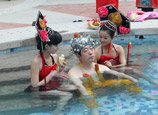
 |
| (Xinhua) |
June 23, 2011 was a sad day for South Korean Pop fans the world over when news broke that Lee Eun Mi, 24, was reportedly stabbed 65 times by a jealous boyfriend who saw red after Lee had broken up with him. Lee had been the lead vocalist of the girl band Iris and made her debut in 2005 with the group's first album, Message of Love.
It's not known whether the beau in question understood the point of this particular message or if he, like many young Chinese, just simply didn't like the over-produced, sugary and image-centric nature of K-Pop.
The K-Pop industry is big business across Asia. Since the '90s, a Korean wave - a term coined by Beijing journalists in mid-'99 to describe the growing popularity of Korean culture in China - has been ever-present in the lives of many young Asians.
In China specifically, what seems to be the case is that the corporate machine that is K-Pop is stronger than ever in 2013. Just this past weekend, pop group TVXQ played a show in Hong Kong to 10,000 fans before embarking on a worldwide tour.
But some young Chinese think K-Death would be a better option.
"China is a great country and should not be allowed to be insulted by a smaller country like Korea," read one angry comment on video streaming website Youku.
The comment refers to a video of Korean pop singer and actress Lee Jung Hyun, 32. In the video, she recounts a close call with some thuggish-looking Chinese as her entourage drove through a mountainous pass.
"A bunch of Chinese robbers were in front of our car. Chinese robbers are known for their cruelty," says Lee.
"They made us get out of the car. I'm like, 'I'm so dead,'" she says. "One of my songs 'Wa' is quite popular in China. The robbers had heard it before, but the funny thing was they didn't recognize me or even know my name," she says with a hint of surprise. "In the end I had to sing it to prove to them who I really was."
The story prompted another user to comment, "A plastic surgeon must have damaged her brain."
K-Pop stars like Lee have never been just about the singing. Much of K-Pop is essentially a commercial endeavor with Simon Cowell types at the helm. Groups are designed to snag big audiences across a multitude of entertainment platforms like TV presenting or acting.
For some young Chinese, the ubiquity of K-Pop stars in the middle kingdom is too much to bear.
"I began to hate K-Pop because of TVXQ," says Zhang Tingyu, 21, a student at North China University of Technology here in Beijing. "They always say bad things about China. But their Chinese fans still support them. They're like a bunch of morons."
TVXQ is run by SM Entertainment, the Seoul based K-Pop factory that also manufactured Super Junior and its offshoot Super Junior-M.
"SJM used to be really popular, but they're out of fashion already," says Liu Chang, 22, a student in Beijing.
"I remember Super Junior once said something bad about China," says Zhang. "That really annoyed me. What really worries me is that Chinese are imitating Korean boy groups. They're so stupid."
Qian Chengya contributed to this story
















 The journey is more important than the destination:Three people who opted for an adventure tell stories.
The journey is more important than the destination:Three people who opted for an adventure tell stories.


![]()
